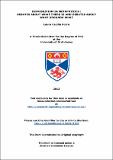Files in this item
Dismissivism in metaphysics : debates about what there is and debates about what grounds what
Item metadata
| dc.contributor.advisor | Hawley, Katherine (Katherine Jane) | |
| dc.contributor.advisor | Brown, Jessica (Jessica Anne) | |
| dc.contributor.author | Porro, Laura Cecilia | |
| dc.coverage.spatial | 148 | en_US |
| dc.date.accessioned | 2013-10-21T14:16:27Z | |
| dc.date.available | 2013-10-21T14:16:27Z | |
| dc.date.issued | 2013-11-30 | |
| dc.identifier.uri | https://hdl.handle.net/10023/4108 | |
| dc.description.abstract | In this thesis I focus on dismissivism in metaphysics. Some philosophers argue that at least some metaphysical disputes are not substantial, and as a consequence should be dismissed. In this work I restrict my attention to metaphysics and focus on debates about existence and grounding. In particular I am interested in finding out whether there is a difference between the possible options available for dismissing debates about what there is and the possible options available for dismissing debates about what grounds what. I will delve into this in two different steps. First of all I explore the possibility to dismiss debates about what there is, and as a case study I analyse the debate between three-dimensionalism and four-dimensionalism. Secondly I delve into whether it is possible to dismiss debates about what grounds what, thanks to the discussion of another case study, i.e. the debate between tropes ontologies and universals ontologies. It is worth exploring the nature of dismissivism, because it bears on the future of philosophy. If philosophy has to have a future, we have to make sure that at least some disagreements within it are substantial. My conclusions will be that metaphysical debates about what there is can be dismissed for a variety of reasons (semantic, epistemic, ...). I also argue there is no general formula to find out whether a specific debate should be dismissed. On the other hand I argue that debates about what grounds what should be dismissed. I offer two distinct arguments in favour of my claim. Firstly, I argue that disputants are having a verbal dispute when they talk about what grounds what, and thus their disagreement is non genuine. Secondly, I argue that the notion of grounding is underspecified, because it cannot be properly distinguished from causation. | en_US |
| dc.language.iso | en | en_US |
| dc.publisher | University of St Andrews | |
| dc.rights | Creative Commons Attribution-NonCommercial-NoDerivs 3.0 Unported | |
| dc.rights.uri | http://creativecommons.org/licenses/by-nc-nd/3.0/ | |
| dc.subject | Dismissivism | en_US |
| dc.subject | Metaphysics | en_US |
| dc.subject | Metametaphysics | en_US |
| dc.subject | Tropes | en_US |
| dc.subject | Universals | en_US |
| dc.subject | Grounding | en_US |
| dc.subject | Three-dimensionalism | en_US |
| dc.subject | Four-dimensionalism | en_US |
| dc.subject | Parsimony | en_US |
| dc.subject | Existence | en_US |
| dc.subject.lcc | BD111.P7 | |
| dc.subject.lcsh | Metaphysics | en_US |
| dc.subject.lcsh | Existentialism | en_US |
| dc.subject.lcsh | Knowledge, Theory of | en_US |
| dc.title | Dismissivism in metaphysics : debates about what there is and debates about what grounds what | en_US |
| dc.type | Thesis | en_US |
| dc.contributor.sponsor | St Andrews and Stirling Graduate Programme in Philosophy (SASP) | en_US |
| dc.contributor.sponsor | Arts and Humanities Research Council (AHRC) | en_US |
| dc.type.qualificationlevel | Doctoral | en_US |
| dc.type.qualificationname | PhD Doctor of Philosophy | en_US |
| dc.publisher.institution | The University of St Andrews | en_US |
| dc.publisher.department | Department of Philosophy | en_US |
This item appears in the following Collection(s)
Except where otherwise noted within the work, this item's licence for re-use is described as Creative Commons Attribution-NonCommercial-NoDerivs 3.0 Unported
Items in the St Andrews Research Repository are protected by copyright, with all rights reserved, unless otherwise indicated.


